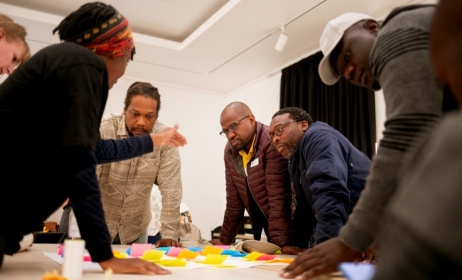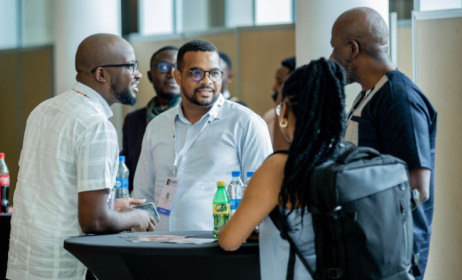Call for applications: Culture at Work Africa project proposals
Culture at Work Africa is calling on creators, cultural institutions, independent art centres, public and private cultural operators, civil society groups, activist groups, community leaders, scholars and local authorities to submit project proposals that promote active citizenship and intercommunity relations.
 The deadline for applications is 21 September.
The deadline for applications is 21 September.
Culture at Work Africa is funded by the European Union and aims to encourage intercultural dialogue, cultural diversity and respect for the equal dignity of all individuals, which contributes to the overarching principles of Agenda 2030 for Sustainable Development Goal such as global citizenship, pluralism and freedom of religion.
Who can apply?
This opportunity is open to organisations from the following countries: Benin, Burkina Faso, Cameroon, Côte d’Ivoire, Democratic Republic of Congo, Kenya, Mali, Niger, Nigeria, Rwanda, Senegal, Tanzania, Togo, Uganda and Zimbabwe.
Projects must take place between 15 November 2018 and 15 May 2020 and should have a minimum duration of between 12 and 18 months.
The deadline for applications is 21 September 2018 (12pm GMT) and both successful and unsuccessful participants will be notified via email by 5 November 2018.
Applications for this fund may be submitted in the following two lots:
Lot 1
Calls for this project aim to enhance public or private cultural spaces as 'safe places' for intercultural dialogue by stakeholders active in the public sphere such as organisations active in the social, educational or environmental fields, youth and cultural centres, schools, universities, libraries and local authorities.
Lot 2
Calls for this project aim at strengthening institutional and professional capacities in intercultural mediation of cultural organisations and operators for social cohesion.
The funds requested for the two lots must fall between a minimum of €20 000 and a maximum of €60 000. However, the indicative amount available for the two lots is €1m.
Requirements
- Applications must be submitted in English or Swahili.
- Applications must involve at least two partners. One of the partners shall act as lead applicant and the other as co-applicant.
- Th lead applicant must be an organisation legally registered and active in the cultural, educational and cultural mediation sector.
- The lead applicant must be directly responsible for the preparation and management of the project proposal with its partners and not act as an intermediary.
- The lead applicant must have a bank account legally registered under their legal name.
- Applicant must specify, in the budget form submitted as part of the full application, that 13% of the grant is for mobility, capacity building and/or networking activities, to cover the costs related to the compulsory attendance, of minimum two representatives of each grant project, to train and peer-to-peer activities organised and coordinated by the Culture at Work Africa throughout the project implementation.
Project eligibility
The following projects are not be eligible for funding:
- Events of religious or political character.
- Projects concerned with sponsorships.
- Projects concerned only or mainly with individual scholarships for studies, research or training courses.
- Projects which consist exclusively or primarily in capital expenditure, such as infrastructure, land and equipment.
- Debts and obligations.
- Projects intended to raise funds for the applicant or its co-applicant(s).
Project evaluation criteria
The project selection process will be based on:
- Relevance of the project.
- Quality of the financial offer.
- Communication strategy.
- Potential of the project team.
- Previous experience.
Disbursement of funds
Payment of funds shall be made in four instalments as follows:
- 60% of the fund upon the signing of the contract.
- 27% of the fund at the end of the project and upon presentation and approval of the report
Applicants should carefully read the full guidelines and evaluation criteria before submitting a project proposal.
Online application forms are available here.
For more information, visit the Culture at Work Africa official website.

































Comments
Log in or register to post comments